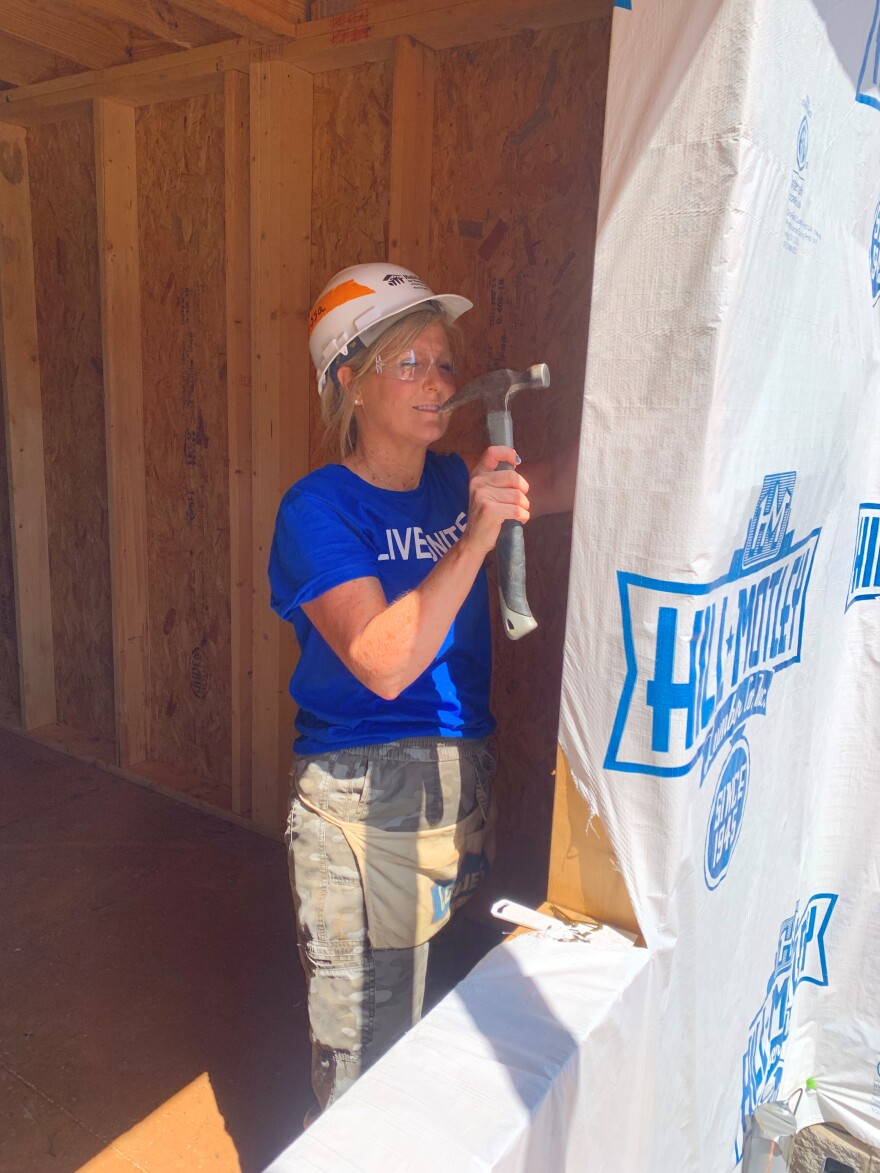A silver lining from the tornado that struck Bowling Green last winter is that some renters are becoming homeowners.
The deadly storm caused major damage to nearly 500 houses and apartments, displacing about 800 individuals. Many are still without permanent housing, but one non-profit will have some families into new homes by this fall.
Among them is Ahmed Hadi who walked through his family's new townhouse under construction by Habitat for Humanity.
“This is one of the bedrooms right here. This is the living room. Upstairs you’ve got three bedrooms and a bathroom, and a back porch," Hadi pointed out. "It’s really nice.”

Ahmed, 24, is about to become a first-time homeowner. The Iraqi native, who came to Bowling Green ten years ago with his family, beamed with pride this month as he walked through the new construction on Regis O’Connor Boulevard.
“It’s beautiful to see," Ahmed told WKU Public Radio. "Every time I come here, it puts a big smile on my face.”
Ahmed hasn’t had a lot to smile about since last December when an EF-3 tornado leveled his family’s home on Moss Creek Ave.
“I was sleeping when the tornado came. My parents woke me up from bed and told me a bad storm was coming. The sound was terrifying, like a train," he recalled. "The tornado came right into our house and took everything. We were all picked up and we landed in the backyard."
Ahmed’s dad, Jalal Hadi, used a walker as he checked on progress at the new townhouse. The family’s rock and primary provider suffered the most injuries, and eight months after the tornado, he’s not been able to return to work as a mechanic. Ahmed, who works as a forklift operator, is purchasing this home for his parents and three siblings.
"Now, after the tornado, I’m mostly responsible for a lot of things now in the house because of my father’s injuries," Ahmed said. "I’ve got to be there for them, always.”
The Hadi family stayed in a hotel following the tornado and later found an apartment to rent. But in a few months, they’ll get the keys to this town home, thanks to the kindness of strangers like John Danielson.
Hurricane clips help prevent tornado damage in Bowling Green home
Danielson is a volunteer with the Bowling Green chapter of Habitat for Humanity.
“I’m learning all of this," he said. "I don’t think I’ve hammered a nail in 15 years, so I’d had to figure out callouses and sore muscles, and there’s a lot of them.”
Danielson was on a ladder with a hammer installing what's known as hurricane clips.
“In case something was wanting to pull the top floor off into the air, this would hold it down to the first floor," Danielson explained.
Habitat for Humanity is working toward a major feat, building ten homes in ten weeks.
“House #9 is actually our 100th house we’ve built as an affiliate, so we’re taking on 10% of what we’ve built since we became an affiliate in the early 90s, in ten weeks," said Habitat Outreach Coordinator Macy Wheeler.

Habitat homes are designed for the working class poor. They typically require no more than 30% of a person’s gross monthly income and the mortgages are 0% interest. The homes are also designed to be very energy-efficient, with electric bills averaging about $30 a month.
“After the tornadoes happened in December, before they hit, there was already such a need for affordable housing in Bowling Green, but it really solidified the crisis we have with affordable housing," Wheeler said. "We wanted to do something big to not only get some people back on their feet, but also put some spirit back in Bowling Green with rebuilding.”
According to FEMA, 65% of the homes in Bowling Green damaged by the tornado were rentals. But the occupancy rate among rental properties is more than 90%. Available apartments are unaffordable for most of the displaced, many of whom are low-income and refugees. For that reason, Habitat volunteers are not just building structures, but hope and a since of relief. The homes will be dedicated and families can begin moving in on Oct. 1.
The ten homes will make a small dent in Bowling Green's housing shortage. According to the Bowling Green-Warren County Planning and Zoning Commission, about 980 new units, both single and multi-family, are under construction and about 500 units are getting repaired from the tornadoes.
However, the city needs an estimated 2,500-3,000 new units per year to meet current and projected short-term demand. The need for housing will increase in coming months with major industries on the way, including Tyson Foods and electric vehicle battery manufacturer Envision.


